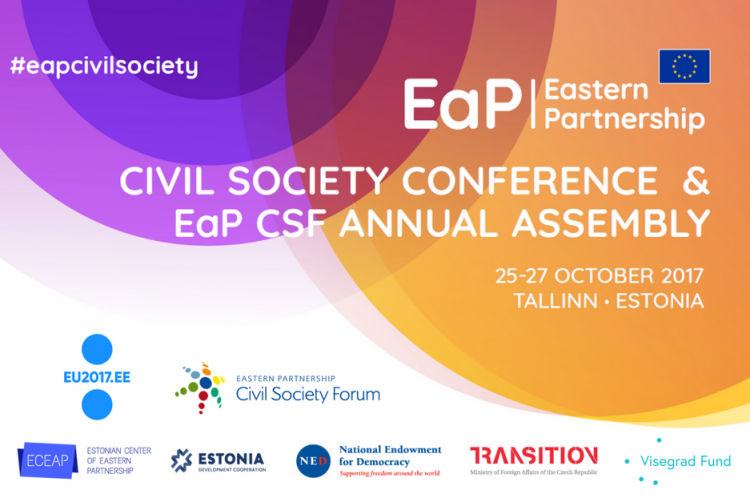The priorities of the civil society from the eastern partnership countries have been identified in Tallinn
Between 25th and 27th of October 2017, in Tallinn, Estonia, was held the Eastern Partnership Civil Society Conference and the 9th Annual Assembly of the Eastern Partnership Civil Society Forum (EaP). The event was attended by over 360 civil society representatives from the countries of the EaP (Armenia, Azerbaijan, Belarus, Moldova, Georgia, and Ukraine), representatives of the European Union (EU) and EU countries, of diplomatic missions and of various European structures. The National Trade Union Confederation of Moldova (CNSM) was represented by Sergiu Sainciuc, vice-president of CNSM.
This year, for the first time, the EaP Civil Society Conference, which is held every two years and is linked to the EaP Summit and the 9th Annual Assembly of the EaP Civil Society Forum, took place simultaneously. This has been aimed to highlight and develop the important role that civil society organizations play in EaP countries in determining the best ways of cooperation between civil society and government.
According to Sergiu Sainciuc, the event is of practical importance because it took place one month before the Brussels summit, in which the leaders of states and governments of the European Union as well as of the partner countries will be convened in November this year. During the Summit will be discussed issues on strengthening cooperation in four priority areas: economic development, governance, cooperation and contacts between people.
“Representatives of civil society in the Republic of Moldova focused their discussions on the reforms under the Association Agreement and the Free Trade Agreement with the EU. There were also discussed basic issues that do not favour the cooperation between the civil society and the government and about the problems that prevent the development of the civil society”, said Sergiu Sainciuc.
During the talks were examined the current state of relations between government and civil society in the countries of the Eastern Partnership. A particular attention was paid to the issue of the role of civil society in different situations and how they could be supported by both governments and the EU. It has also been examined how the EaP structure, as well as the concrete tasks resulting from the “20 Results to 2020″ goals, can be used more effectively to strengthen the role of the civil society in EaP policy. Another aspect discussed related to support the development of inclusive societies and to support sustainable democratic reforms.
At the end of the first session, the civil society organizations of the EaP countries made a Statement to the leaders of states and governments participating in the EaP Forum, to be held in Brussels in November 2017. Thus, NGOs call for better governance, respect of human rights and examples of punishment for violating these rights, ensuring freedom of the press and ensuring the protection of journalists being in risk conditions, ensuring the development of the free economy and developing the infrastructure for all citizens.
The Declaration of Civil Society Organizations from the 6 member states of EaP refers to several areas where more involvement of European partners is needed. “Strengthening the relationship between good governance and institutional resilience so as to ensure a non-corrupt environment in which human rights are respected, professional and transparent public services are provided, where justice is administered impartially and non-partisan,” it is said in the Declaration in which are tackled in specific chapters the necessities in the field of human rights, mass-media freedoms, in the field of environment, national security, economic and energy development.
During the discussion sessions, were analysed the priorities of civil society in all the EaP countries, the perspectives of regional and economic integration in the countries of the EaP, the mass media and disinformation in the EaP and the EU countries, gender issues, small and medium-sized enterprises – how can we benefit from the EU common market?, a favourable environment and energy security in the EaP, the contribution of social dialogue to optimizing labour migration, challenges and opportunities for young people in the EaP after the Summit: how to support employment and entrepreneurship among the young people.
At the last plenary session, conclusions and recommendations on the existing and potential challenges for the EaP were made. An evaluation of the EaP Forum’s work in 2017 was performed and the new Organization Strategy for the 2018-2020 and institutional reform scenarios of the Eastern Partnership Civil Society Forum were approved.



